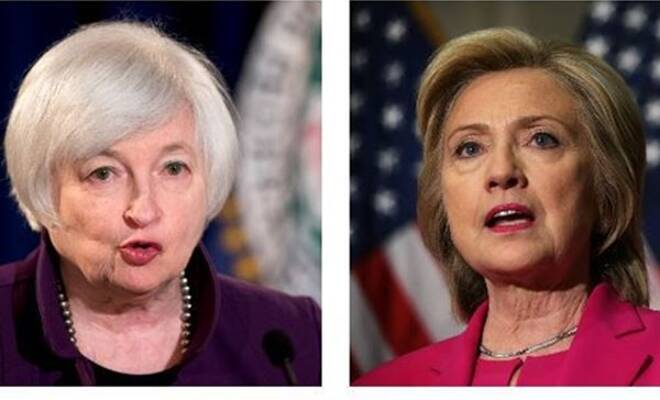Advertisement
Advertisement
Who Is More Powerful, Janet Yellen or Hillary Clinton
By:
For near a hundred years’ central bankers remained in the background of their political and economic press and headlines. It was for a central banker to
For near a hundred years’ central bankers remained in the background of their political and economic press and headlines. It was for a central banker to address the public and when they did, they spoke with a jargon known as bankereze which the general public could not understand. Bankers avoid the spotlight and managed inflation and employment goals from quiet offices full of accounts, lawyers and economists. Most citizen classified central banks as “eggheads”. Allan Greenspan lead the US Federal Reserve from 1987 to 2006 earning the respect of financial and economic elite around the globe. On rare occasions he would be interviewed on a talk show but most Americans had little idea who this man was.
When he retired, Ben Bernanke filled his shoes but in just a short while the global financial crisis filled the headlines of international papers as the real estate market tanked and foreclosures became the talk of the town and unemployment soared Mr. Bernanke steps onto the global stage. Over the next 8 years Ben Bernanke became a house hold name and a superstar. Within weeks’ central bankers around the world entered the spotlight.
Most people today can name the heads of the major central banks from around the globe. Mario Draghi, nicknamed Super Mario is followed by a press corps equal in size to some world leaders. Governor Kuroda from Japan, Mark Carney from the UK as well as Steven Poloz from Canada are known around the world.
After serving 8 years as leader of the largest central bank in the world Ben Bernanke retired and handed the reins to Janet Yellen his deputy and protégée at the time. Forbes magazine says that Ms. Yellen is the most powerful woman in the world. Image that an egghead from the world of academia as the most powerful woman in the world.
Janet Yellen is the first female chairwoman of the Federal Reserve and serves as the most influential economist in the United States. Yellen’s historic path to the Fed was paved with hard work, excellent political connections and a belief in the ability of economists to help working families. Yellen remains an incredibly powerful political and economic voice in the U.S. and across the world thanks to her title.
On Friday afternoon from a quite private resort unknown to the public until Mr. Bernanke used his speech at the symposium to introduce “Quantitive Easing”. This year most of the entire world will be turned into Janet Yellen’s speech which will be reported live on every major newspaper and network around the globe. Her words will be digested and regurgitated over and over, her attitude and her tone will be dissected and interpreted. A simple change in words or tone could spark volatility in the markets around the world.
As leader of America’s central bank, the Federal Reserve, Yellen has immense influence over global financial markets and the U.S. economy. Trillions of dollars can be lost or gained based on how investors interpret each word that comes out of Yellen’s mouth.
But volatile financial markets are the last thing Yellen wants. In fact, she often speaks in a monotone voice about Fed policy, attempting to avoid words or intonation that might rattle investors. Traders have further pushed forward their expectations for a rate increase, pricing in a 30 percent probability of a move next month. They’re betting on a 56 percent chance the Fed will act by December, up from 36 percent at the end of July. Data due before Yellen speaks include a revised look at second-quarter growth and a reading on consumer confidence. With the U.S. economy in a better spot, Yellen is likely to acknowledge the recovery in growth and employment, but at the same time hide behind data dependency to not commit to any specific rate path. She probably wants to talk down the risk markets lest they potentially get consumed by irrational exuberance.
At the same time, Yellen does not want to repeat the Fed’s mistakes of 2015 that led to the global economy cratering. Maintaining that delicate balance is a tough calling but that is exactly what the Fed and Yellen are trying to successfully do.
About the Author
Barry Normanauthor
Advertisement
